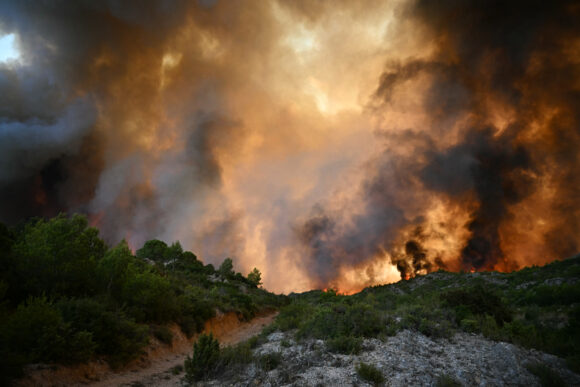France’s biggest wildfire in about two decades ravaged vineyards and farms in southern France, leaving one person dead and forcing residents to flee.
About 2,100 firefighters, assisted by aircraft, are working to control the blaze in the southwestern department of Aude, according to local officials. More than a dozen people have been injured, including a firefighter who was in critical condition as of late Wednesday. The fire, fanned by winds gusting up to 70 kilometers (44 miles) per hour, shut roads and cut power to thousands of homes.
The fire ignited on Tuesday, burning 16,000 hectares (39,537 acres), an area bigger than Paris, according to public broadcaster France Info. It quickly spread through farmland baked by recent heat waves, which turned crops into kindling and dried soils enough to uproot grapevines that are prone to catching fire.
Climate change is increasing the intensity of heat waves in Europe, the world’s fastest warming continent. That’s triggering more extreme weather events, including violent storms and wildfires, with the Mediterranean region particularly vulnerable.
Temperatures this week are set to climb several degrees above the long-term average across the region, topping 38C (100F) on Thursday, according to Meteo France. The mercury could inch even higher over the following days as the heat wave that’s searing Iberia moves east.
In an X post Wednesday, European Commission President Ursula von der Leyen said EU officials were ready to mobilize disaster response resources to assist fire crews in France.
France has issued amber fire alerts for departments along the Mediterranean coast, with authorities in Portugal and Spain also warning of dangerous wildfire risks across much of the peninsula.
The wave of hot air moving across Europe could be boosted by tropical storm Dexter as it moves across the Atlantic. The storm will degrade into a well of low pressure as it moves east, but weather models used by the UK Met Office and the European Centre for Medium-Range Weather Forecasts show it tracking north toward the UK.
If that happens, it will likely bring stormy weather to the UK, but the low pressure is expected to drag a wave of warm air across the continent, said Alex Burkill, a meteorologist at the Met Office.
“Generally, there’s fairly good consensus that temperatures are going to be above average — and in some cases significantly above average — as we go through into next week,” he said.
The extra nudge from Dexter is forecast to fuel heat wave conditions across France and parts of the Mediterranean early next week. Temperatures in Toulouse could reach 42C on Monday, data from Atmospheric G2 show.
The heat wave could force utility company Electricite de France SA to shut down nuclear reactors as rising river temperatures limit plant cooling, according to MetDesk meteorologist Richard Martin-Burton. French power prices on Tuesday rose to their highest since March on concerns about the impact of the heat on reactor output.
Photograph: A forest is engulfed in flames as a wildfire rages near Fontjoncouse, southwestern France, on Aug. 6, 2025. Photo credit: Lionel Bonaventure/AFP/Getty Images
Was this article valuable?
Here are more articles you may enjoy.



 Florida Engineers: Winds Under 110 mph Simply Do Not Damage Concrete Tiles
Florida Engineers: Winds Under 110 mph Simply Do Not Damage Concrete Tiles  Florida Regulators Crack the Whip on Auto Warranty Firm, Fake Certificates of Insurance
Florida Regulators Crack the Whip on Auto Warranty Firm, Fake Certificates of Insurance  Experian Launches Insurance Marketplace App on ChatGPT
Experian Launches Insurance Marketplace App on ChatGPT  World’s Growing Civil Unrest Has an Insurance Sting
World’s Growing Civil Unrest Has an Insurance Sting 

